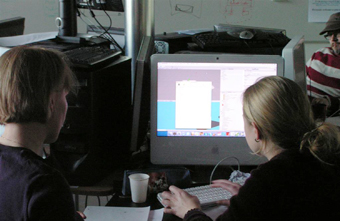UAlbany�s Center for Technology in Government Releases Findings on National Survey of Cross-Boundary Information Sharing
Contact(s): Catherine Herman (518) 956-8150
 |
The goal of the CTG report is to enhance governments� performance, accountability, and transparency. |
ALBANY, N.Y. (October 12, 2009) -- The University at Albany's Center for Technology in Government has released a new report summarizing the results of a national survey of cross-boundary information (CBI) sharing in the public sector. The national survey and the findings presented in the report are the result of a U.S. National Science Foundation-funded project that began in 2002. The primary goal of this long-term project has been to understand how governments share information across program, agency, and jurisdictional boundaries as they work to improve governmental programs and services.
"The identification of a consistent set of factors and the understanding of how they interact to influence CBI initiatives will provide practitioners from around the world with important knowledge necessary to ultimately increase governments� performance, accountability, and transparency," said Brian Burke, senior program associate at CTG.
The report highlights several factors that stood out among the 41 included in the survey. For example, survey participants reported that clarity of roles and responsibilities; knowledge of organizational policies and information needs; informal problem solving; and information confidentiality, security, privacy, and disclosure concerns were prominent in the course of their CBI initiatives.
The national survey involved over 700 government professionals from criminal justice and public health agencies at the local and state levels from across the 50 states. The survey was conducted to test the generalizability of a preliminary theoretical model of the interactions of policy, organizational, social, and technical factors in criminal justice and public health information sharing initiatives. This model was developed by CTG researchers based on eight case studies that focused on cross-boundary information sharing projects in the areas of criminal justice and public health in the states of New York. Colorado, Connecticut, North Carolina, and Oregon, as well as in New York City.
CTG will continue to analyze the project data to test the weight of each of the factors as compared to their overall influence, and make further results available in both academic and practitioner publications. The findings will be incorporated into new research efforts as CTG continues to work with governments around the world to foster public sector innovation, enhance capability, generate public value, and support good governance.
The mission of the Center for Technology in Government at the University at Albany is to foster public sector innovation, enhance capability, generate public value, and support good governance. CTG specializes in applied research, knowledge sharing, and collaboration at the intersection of policy, management, and technology. For more information visit www.ctg.albany.edu.
Follow the University at Albany on Facebook and Twitter.
![]() For more news, subscribe to UAlbany's RSS headline feeds
For more news, subscribe to UAlbany's RSS headline feeds
Educationally and culturally, the University at Albany-SUNY puts "The World Within Reach" for its 18,000 students. An internationally recognized research university with 58 undergraduate majors and 128 graduate degree programs, UAlbany is a leader among all New York State colleges and universities in such diverse fields as public policy, nanotechnology and criminal justice. With a curriculum enhanced by 300 study-abroad opportunities, UAlbany launches great careers. For more information about this globally ranked University, visit www.albany.edu. For UAlbany's extensive roster of faculty experts, visit www.albany.edu/news/experts.shtml.


